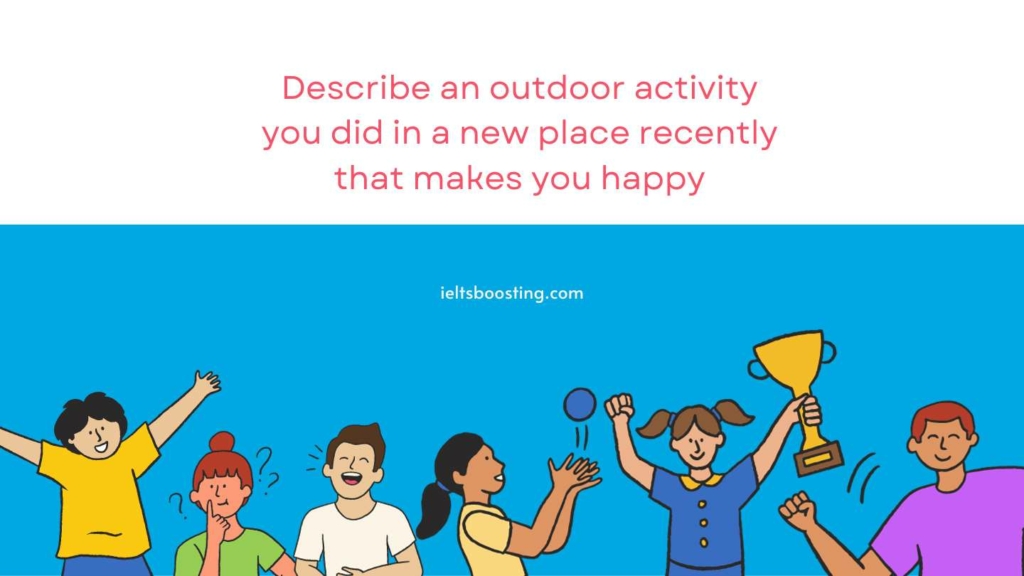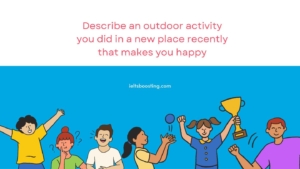Describe an outdoor activity you did in a new place recently that makes you happy
You should say:
What the activity is
Who invited you to participate in it
Whether you asked for help in the activity
And explain what change you had in the activity
Use this sample, just change a few to answer this topic is ok. However, you can use below sample
Describe an unusual holiday or vacation you went on

Describe an outdoor activity you did in a new place recently that makes you happy
Sample answer
Part 3- Describe an outdoor activity you did in a new place recently that makes you happy
Where do people like to go for these activities?
In many regions, people often gravitate towards natural settings for outdoor activities, seeking a break from the urban hustle. Parks and recreational areas are popular choices, offering green spaces where individuals can engage in activities such as jogging, picnicking, or simply enjoying nature. Coastal areas attract those interested in water-based activities like swimming, surfing, or beach volleyball. Additionally, hiking trails and mountainous terrains provide opportunities for adventure enthusiasts to explore and experience the great outdoors.
Useful Vocabulary:
- Recreational areas: Spaces designed for leisure and enjoyment.
- Urban hustle: The busy and hectic nature of city life.
- Green spaces: Areas with grass, trees, and plants, often used for relaxation.
- Picnicking: Having a meal outdoors, usually in a park or similar setting.
- Coastal areas: Regions near the sea or ocean.
- Water-based activities: Recreational activities that involve bodies of water.
- Surfing: Riding on ocean waves using a surfboard.
- Adventure enthusiasts: People who seek and enjoy thrilling and challenging activities.
- Hiking trails: Paths or routes designated for walking or trekking in natural landscapes.
- Mountainous terrains: Areas characterized by mountains and elevated landscapes.
What outdoor activities are popular in Vietnam?
There are many outdoor activities that are popular in Vietnam (opinion) because of its diverse natural landscapes and climate (reason) For example, some people enjoy caving in Phong Nha, rock climbing in Hữu Lũng, canyoning in Dalat, or kitesurfing along the coast (example) Other common outdoor activities are hiking, camping, cycling, golf, and yoga (alternative)
Some useful vocabulary and their meanings for this topic are:
- landscape: the visible features of an area of land
- caving: the sport or pastime of exploring caves
- rock climbing: the sport or activity of climbing rock faces, especially with the aid of ropes and special equipment
- canyoning: the sport of jumping into a fast-flowing mountain stream and allowing oneself to be carried downstream at high speed
- kitesurfing: the sport or pastime of riding on a modified surfboard while holding on to a specially designed kite, using the wind for propulsion
- hiking: to walk for a long distance, especially across country or in the woods
- cycling: to ride a bicycle
Are those people who like dangerous activities more likely to be successful?
I think this is a complex question that does not have a simple answer (opinion) There are some studies that suggest that risk-takers are more likely to be successful because they are more innovative, confident, and resilient (reason) For example, some famous entrepreneurs like Richard Branson or Elon Musk have taken many risks in their careers and achieved remarkable results (example) However, there are also many risks that can lead to failure, loss, or harm, so it is not always wise or beneficial to seek danger (alternative)
Some useful vocabulary and their meanings for this topic are:
- risk-taker: someone who is willing to do things that involve danger or uncertainty
- innovative: introducing or using new ideas or methods
- resilient: able to recover quickly from difficulties or challenges
- entrepreneur: someone who starts and runs their own business
- wise: having or showing good judgment or understanding
- beneficial: producing good or helpful effects or results
Do you think it’s better for people to change jobs when there are new chances?
I think it depends on the individual’s situation and goals (opinion) Some people may prefer to change jobs when there are new chances because they can learn new skills, earn more money, or advance their career (reason) For example, someone who is unhappy with their current job or feels stuck in a dead-end position may look for better opportunities elsewhere (example) However, some people may choose to stay in their current job because they are satisfied with their work, enjoy their colleagues, or value their stability (alternative)
Some useful vocabulary and their meanings for this topic are:
- learn new skills: to acquire new abilities or knowledge that can be useful for work or personal development
- earn more money: to receive a higher income or salary
- advance their career: to move up to a higher level or position in one’s profession
- unhappy: feeling dissatisfied or discontented
- stuck: unable to move or progress
- dead-end: offering no prospects of improvement or advancement
- satisfied: feeling pleased or fulfilled
- enjoy: to take pleasure or delight in something or someone
- value: to regard something or someone as important or beneficial
- stability: the state of being steady or secure
Should young people try as many new activities as possible?
Yes, I think young people should try as many new activities as possible (opinion) because it can help them discover their talents and interests (reason) For example, if they try different sports, arts, or hobbies, they might find something that they are passionate about or good at (example) This can also benefit them in their future career choices, as they will have a wider range of skills and experiences to draw from (consequence)
Some useful vocabulary for this topic are:
- Discover: To find or learn something for the first time; to uncover or realize.
- Talent: Natural aptitude or skill in a specific area, often leading to exceptional performance.
- Interest: A feeling of curiosity or concern about something; the state of wanting to know or learn more about a particular subject.
- Passion: A strong and intense enthusiasm or emotion towards a specific activity, cause, or interest.
- Benefit: An advantage or positive outcome gained from a particular action, situation, or decision.
- Career: The pursuit of a lifelong ambition or the general course of progression towards lifelong goals, often associated with one’s employment.
- Skill: Proficiency, ability, or expertise acquired through training, experience, or practice in a specific area.
- Experience: The knowledge and skills acquired over time through direct involvement or exposure to events, activities, or situations.
When do people usually go outdoors to get close to nature?
People usually go outdoors to get close to nature when they have some free time or want to relax (opinion) Going outdoors can help them reduce stress, enjoy fresh air, and appreciate the beauty of nature (reason) For instance, some people may go hiking, camping, or cycling in natural areas during weekends or holidays (example) Others may simply visit a park, a garden, or a zoo near their home or workplace (alternative)
Some useful vocabulary and their meanings for this topic are:
- reduce stress: to lower the level of anxiety or pressure that one feels
- appreciate: to recognize and value the good qualities of something or someone
- hiking: to walk for a long distance, especially across country or in the woods
- camping: to stay in a tent or other temporary shelter outdoors
- cycling: to ride a bicycle
- alternative: another possibility or choice


